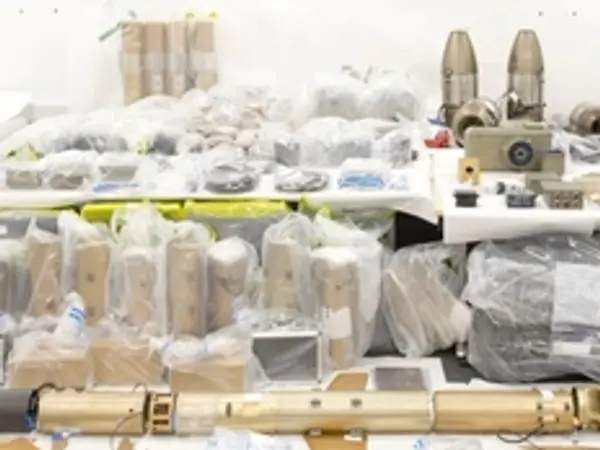Britain’s announcement this week of the seizure at sea of weapons apparently heading for Yemen followed expert examination assessing they had come from Iran.
Thursday’s statement from the United Kingdom Ministry of Defence justified the Royal Navy impounding surface-to-air missiles and other hardware under United Nations Security Council resolution 2140, passed in 2014. This imposed an arms embargo on named leaders of Ansar Allah, or the Houthis, and was in February extended to the Houthis as a whole.
The anti-ISIS coalition, Inherent Resolve, tweeted that the “successful seizure of smuggled Iranian missiles is another example of Iran violating int'l law, supporting terrorism & threatening Int’l peace & security. Together with our allies & partners, we remain committed to deterring their destabilizing activities.”
The British announcement came with Yemen in the fifth month of a fragile ceasefire between the Houthis and Saudi Arabia, just ahead of United States President Joe Biden’s 13-16 July Middle East visit, and with US-Iran nuclear talks paused.
US Republican Senator Jim Risch, ranking member of the Foreign Relation Committee tweeted, “As the Biden Admin tries to rush back into the JCPOA, Iran continues to destabilize the Middle East and flood the region with illicit weapons. US sanctions relief will only serve to increase Iranian terrorism.”
London’s statement on the arms seizures said marines, deployed in inflatable boats from the Royal Navy ship HMS Montrose, had found the weapons in “speedboats being operated by smugglers in international waters south of Iran” on January 28 and February 25, following the scanning of vessels by helicopters.
The weapons were returned to the UK for technical analysis that “revealed that the shipment contained multiple rocket engines for the Iranian produced 351 land attack cruise missile and a batch of 358 surface-to-air missiles.”
The cache was also inspected on June 24, said the British statement, by experts appointed by the UNSC – which might account for the timing of Thursday’s announcement some months after the interception.
‘Loitering’ missiles
This is believed to be the first British interception of relatively sophisticated weapons supplied to the Houthis by Iran. The 358 is a ‘loitering’ missile designed to stay aloft and target airplanes, while the 1000-km-range 351 cruise missile has been fired by the Houthis at targets in Saudi Arabia and was possibly used to attack Abu Dhabi on January 17, killing three civilians. Similar missiles were impounded by the USS Normandy in the Arabian Sea in 2019.
The Iranian foreign ministry in a tweet Thursday disputed the “moral authority” of the British to “make a claim” against Iran, arguing that the UK was “continuously selling advanced weapons to the self-proclaimed military coalition against the defenseless people of Yemen,” making the UK “a partner in the war and aggression against Yemen…and…not in a position to make such baseless accusations...”
The UK has faced criticism over arms sales including strike aircraft to Saudi Arabia, which began its armed intervention in 2015 in support of ousted president Abdrabbuh Mansur Hadi against Houthi rebels.
Yemen ceasefire
The current four-month ceasefire in Yemen is expected to be high on Biden’s agenda in his looming visit to Saudi Arabia, part of the US president’s Middle East tour July 13-16. There have been reports that the Yemen ceasefire was negotiated by the Saudis in Beirut with Hezbollah, the Lebanese party allied to Iran, acting on behalf of the Houthis.
Sea lanes around Yemen are increasingly contentious. Israeli Defense Minister Benny Gantz claimed Tuesday that Iran was expanding its naval presence in the Red Sea.
The HMS Montrose, a type 23 frigate, operates as part of the 38-nation Combined Maritime Forces (CMF), which counters illicit non-state operations including drug seizure. In January HMS Montrose seized one shipment of 663kg of heroin, 291kg of hashish and 87kg of methamphetamine in the Gulf of Oman.
